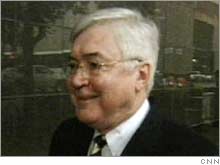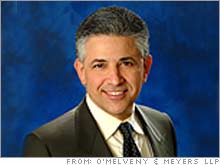|
Enron's defense could be brilliant... or crazy
Lawyers for Lay and Skilling are undertaking a risky defense strategy. Will it pay off?
NEW YORK (CNNMoney.com) - If there's one word to describe the Enron defense team, it's gutsy. Two weeks into the trial of Enron founder Kenneth Lay and former chief executive Jeffrey Skilling, the defense's strategy so far has been clear: Undermine the credibility of the government's witness and barrage the jury with a deluge of complicated and, sometimes, mind-numbing corporate conference calls in an effort to show the defendants were unaware of any corporate chicanery at the company.
It's a strategy that defense teams have widely used in the recent corporate trials ranging from HealthSouth (Research) to WorldCom with mixed results. But with Enron -- the granddaddy of all cases of corporate malfeasance -- Lay and Skilling's dynamic duo of defense attorneys, Houston-based Michael Ramsey and Los Angeles-based Daniel Petrocelli, are taking their defense one step further. The attorneys contend that not only were the defendants unaware of any wrongdoing but, with the exception of a few bad apples, Enron never committed any fraud. They blame negative publicity, courtesy of the former CFO Andrew Fastow's questionable side deals, and a lack of market confidence in the post-bubble environment for the company's implosion in December 2001 -- an event that sparked billions of dollars in losses for investors and paved the way for a slew of corporate scandals A brilliant but risky defense
It's an incredibly brilliant line of defense, legal experts say. Or an incredibly crazy one. Jim Parkman, an attorney in association with the Cochran Firm, who successfully defended HealthSouth's former CEO Richard Scrushy in a similar fraud case, said the Enron defense team will now have to provide some pretty hefty evidence to support their theory that a crime never happened. "It's a tough thing to sell," he said. "If the prosecutors can prove the fraud occurred and the defense lawyer insists it didn't happen, you're in trouble right there. " Parkman said HealthSouth's Scrushy was able to win an acquittal because the defense chose to admit to the jury that fraud had occurred at the company. By coming clean that wrongdoing had occurred, he said the defense was able to focus on proving that Scrushy was unaware that his executives had been misleading investors. It saved the defense the trouble of focusing on explaining complex accounting issues and allowed defense lawyers to illustrate how well the fraud had been hidden from everyone, including the defendant, he said. But Enron's defense team is shrugging off "the ostrich defense" and opting for a riskier play. By subjecting the jury to hours of audio and video tapes of corporate conference calls, the defense hopes to paint Skilling and Lay as hands-on leaders that were truly optimistic about the prospects for their company. Drowning jury in detail
In his cross-examination last week of the government's first witness Mark Koenig, the executive vice president of investor relations, Petrocelli played full-length tapes in which the executives were heard outlining a number of challenges at the company, but then declared that the company was in excellent shape. While prosecutors played snippets of the same tapes implying that the company deliberately misled investors with their bullish comments, the defense countered that accusation by saying that the tapes, in their entirety, illustrate that Lay and Skilling were honest about challenges but truly believed in Enron's strength. It's a good strategy, legal experts said, but not fool-proof. The Cochran Firm's Parkman said jurors can get irritated if they feel that the defense is wasting their time -- a complaint the prosecution has been quick to point out. Legal experts said there are other benefits to playing the tapes in their entirety despite the risks. "It takes away from the momentum of the government's case," said Jo Anne Adlerstein, an attorney in the white collar defense group at Brown Raysman Millstein Felder & Steiner LLP. "If they're drowning the jury in details, there's a chance that they will miss the theme of the prosecution." By playing the full tapes, the defense hopes to score double points: provide more favorable context of Lay and Skilling's comments to employees and investors and also demonstrate to the jury just how complicated Enron's business was during the years it was purportedly flourishing, she said. The desired end result? Confusion and, by extension, reasonable doubt over how much Lay and Skilling really knew. Grilling the government's star witness
But legal observers say the defense's finest hour will come when Ramsey and Petrocelli cross examine Fastow, the prosecution's star witness. Fastow pleaded guilty to two counts of wire and securities fraud in 2003 and was sentenced to 10 years in prison in return for his expected testimony. Fastow's credibility has come under attack in recent months after newly unsealed documents showed the former CFO denied being involved in a tax conspiracy with his wife -- a charge both he and his wife Lea Fastow later pleaded guilty to. Scott Meyers, partner in the securities litigation group at Levenfeld Pearlstein, said Enron's defense team will be aggressive in their cross-examination of Fastow. "They will argue that (Lay and Skilling's) decision making was as good as the information they were provided and fully point the finger at Fastow," he said. "He will be portrayed as the anti-Christ." But the defense will have to be careful as it handles other government witnesses, especially those former executives who have pled guilty and are now testifying for the prosecution. In his cross-examination of Koenig last week, Petrocelli brought the former executive to tears by implying that he had pled guilty simply to protect his family. However, Koenig refused to back down and insisted that he was guilty. That can be dangerous for the defense. "You have to be careful that the jury doesn't say 'these are good family men with kids that wouldn't have really pled guilty if there wasn't something wrong'," Parkman said. A last resort
While experts are confident that Ramsey and Petrocelli will give the prosecution a strong fight despite their risky strategy, legal observers questioned the benefits of putting Skilling and Lay on the stand -- a move that has been raised as a distinct possibility. "My biggest interest is to the degree that they will stay on the same page and avoid the temptation of pointing the finger at each other," said Meyers. "If Lay gets on the stand, he'll be asked questions about his relationship with Skilling and it will make it hard to keep from pointing the finger at him. The prosecution will use that as an opportunity to drive a wedge between them." Defense attorney Adlerstein added that its an extraordinarily risky move to put the defendants on the stand. "It's only a last resort if you're certain that the ship is sinking," she said. --------------------------------------------------------------
Click here for more dispatches from the Enron trial. |
|


